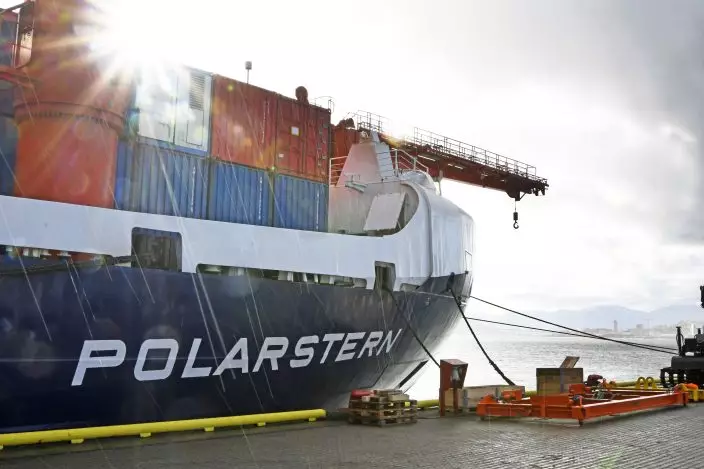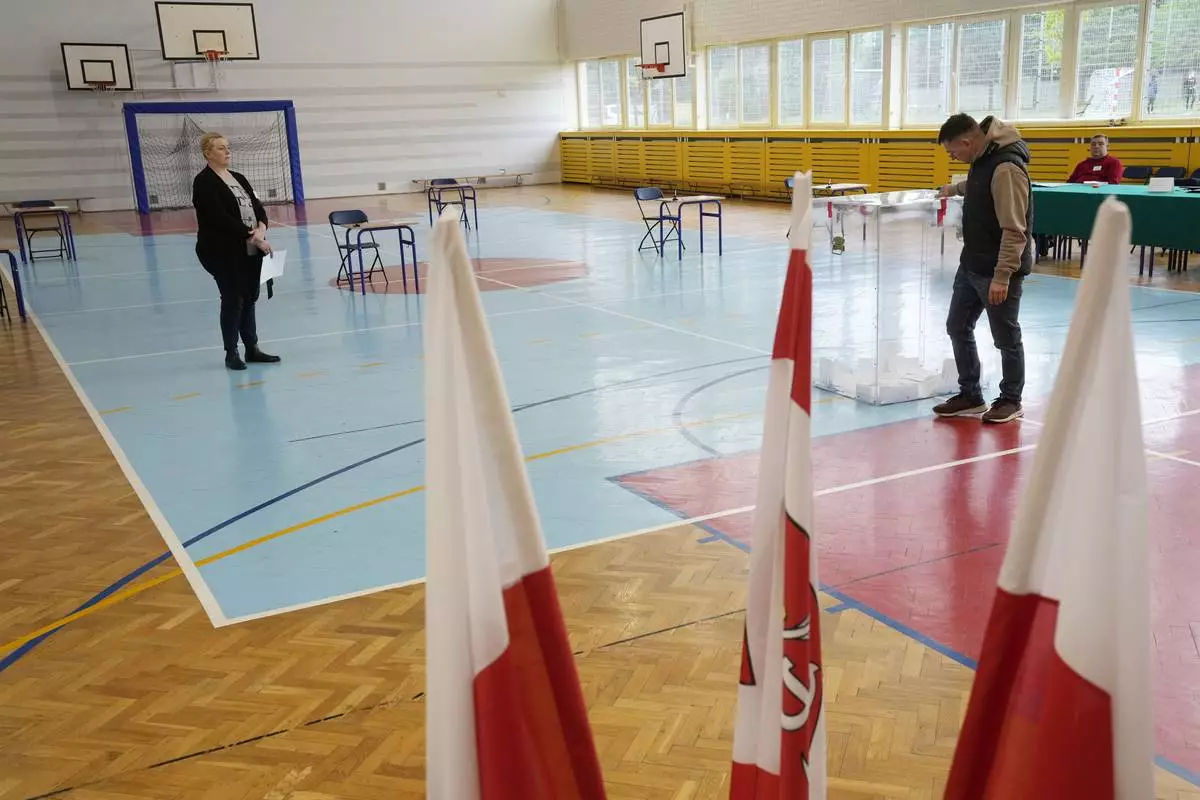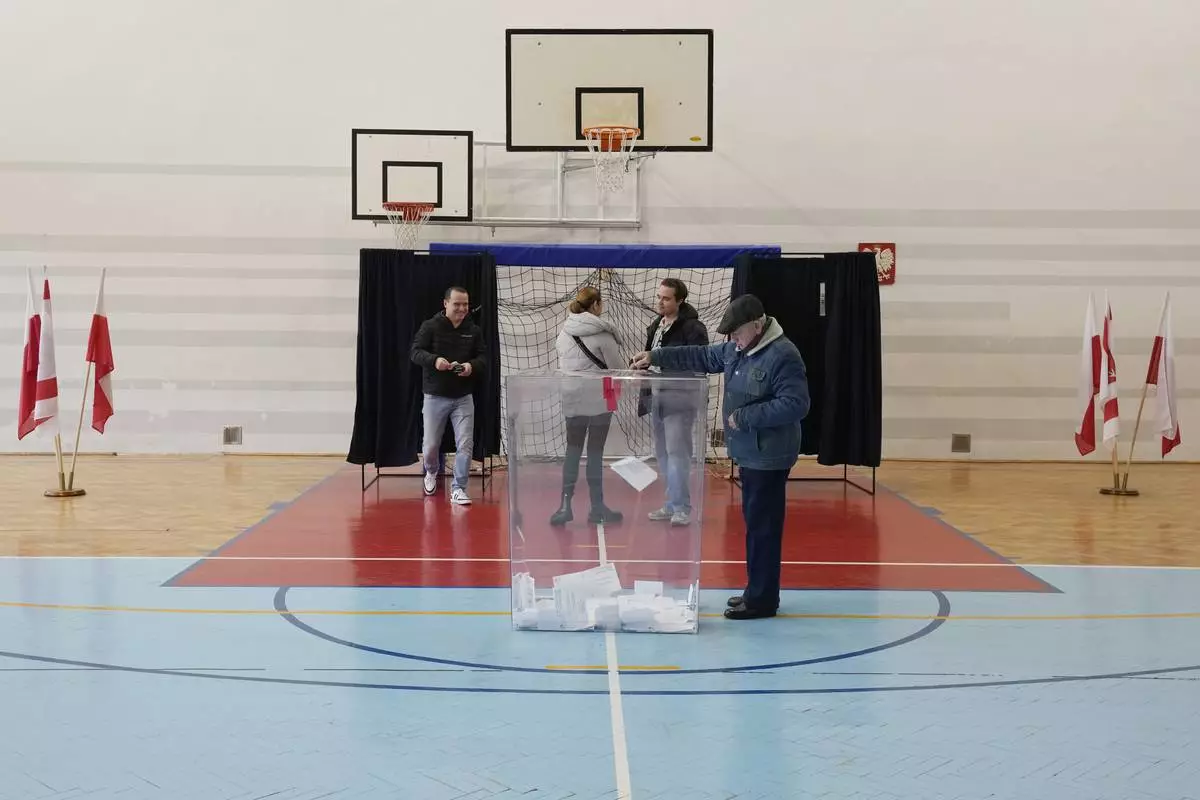Researchers from more than a dozen nations prepared Friday to launch the biggest and most complex expedition ever attempted in the central Arctic — a yearlong journey through the ice they hope will improve the scientific models that underpin our understanding of climate change.
The 140-million euro ($158 million) expedition will see 600 scientists from 19 countries including Germany, the United States, Britain, France, Russia and China work together in one of the most inhospitable regions of the planet.
"The Arctic is the epicenter of global climate change," said Markus Rex of Germany's Alfred Wegener Institute for Polar and Ocean Research, who will lead the expedition. "At the same time the Arctic is the region of the planet where we understand the climate system least."

The German icebreaker and research vessel Polarstern at shore in Tromso, Norway, Wednesday Sept. 19, 2019. Scientists from more than a dozen nations are preparing to launch the biggest and most complex research expedition ever attempted in the central Arctic. About 100 researchers will set sail Friday from Tromso, Norway, aboard the German icebreaker Polarstern in an effort to understand how climate change is affecting the Arctic and regions beyond. (Rune Stoltz BertinussenNTB Scanpix via AP)
Packed full of scientific equipment, the German icebreaker RV Polarstern will leave the port of Tromsoe in northern Norway accompanied by a Russian vessel to search for a suitably large ice floe on which to anchor and set up base.
As the days get shorter and the sea freezes around it, the Polarstern will slowly drift off on its own toward the North Pole while rotating teams of 100 scientists spend two months each conducting research on the ice.
Stefanie Arndt, a sea ice physicist who will join the mission in mid-February, said the unique advantage of this expedition compared with others is the fact that researchers will be able to observe processes in the Arctic across an entire cycle of seasons.
"What's particularly interesting is the transition from winter to spring," she said, a time when the ice is normally too thick for ships to reach the Central Arctic.
Recording changes in the density, size and type of snow will help scientists better understand the flows of energy in the Arctic.
"For example, how much light the snow reflects back into the atmosphere, how much it absorbs and how much light reaches the upper ocean," said Arndt. "This has big implications for the ecosystem."
Energy from light affects algae growth and ocean temperatures, which in turn influence how much sea ice melts from below.
Understanding these and other complex processes occurring in the Arctic is essential for the increasingly sophisticated computer models scientists use to predict weather and climate. Experts believe that any disruption to the Arctic's delicate cycle of freeze-and-thaw will be felt farther south, though it's still not clear how.
Recent changes in the jet stream — a current of air that circles and insulates the Arctic like a giant thermos — have allowed warm, moist winds from low latitudes to move north. At the same time, chilly blasts of Arctic air — the dreaded polar vortices — have brought deep freeze conditions to the continental U.S. and Europe.
Concerns about global warming have spread far beyond the scientific community in recent years. The expedition starts on the same day as global climate protests and ahead of a U.N. climate summit in New York next week.
Rex, the expedition head, said the cooperation between scientists from many different countries stands in contrast to the geostrategic jostling that big powers have started engaging in as the Arctic, with its untapped riches, begins to open up to exploration.
He put the fact that Germany, hitherto a second-league player in the Arctic, is leading the expedition down to the country's technical and logistical expertise.
"We're doing it because we can, and nobody else can do it," said Rex.
MOSAiC mission: https://www.mosaic-expedition.org/
WARSAW, Poland (AP) — Polish Prime Minister Donald Tusk expressed satisfaction on Monday after a series of candidates supported by his party won weekend races for mayor.
Candidates from his pro-European Union centrist Civic Coalition, or running with the party's backing, won in a series of cities in the second round of local elections held on Sunday, among them Krakow, Poznan, Wroclaw and Rzeszow.
“It is very difficult to clearly say who won and who lost,” Tusk said Monday. “But if we compare these results, especially in the most attractive places, on these attractive battlefields ... then I actually have reasons for satisfaction.”
“Law and Justice has simply disappeared in many places,” Tusk added at a news conference, referring to the main opposition party.
The results put Civic Coalition in a favorable position as the country looks next to elections to the European Parliament on June 9.
Mayors were chosen in a total of 748 cities and towns where no single candidate won at least 50% of the vote during the first round on April 7.
Candidates for Tusk’s party also recaptured cities where they had not held power for many years, including Zielona Gora, Legnica and Torun.
The local and regional elections were viewed as a test for Tusk's pro-European Union government four months after it took power at the national level. Sunday's second round strengthened the Tusk government's leverage in the cities, which should facilitate cooperation on development projects and allotment of EU funds.
Tusk's allies also won in some places in the first round two weeks ago, including in Warsaw, where incumbent Mayor Rafal Trzaskowski was an easy victor.
In the first round, the right-wing Law and Justice, prevailed on the level of regional assemblies in the country's 16 provinces, where it took 34.3% of the votes, while Tusk's Civic Coalition got 30.6%. Law and Justice governed on the national level from 2015-23.
Tusk’s socially liberal Civic Coalition traditionally has strong support in cities, while Law and Justice has a more solid base in conservative rural areas, particularly in eastern Poland.
Civic Coalition is the largest group in a three-party coalition that governs the EU nation of 38 million people. The coalition is pro-European Union but otherwise spans a wide ideological spectrum with left-wing politicians in the Left party as well as conservatives in the Third Way.

Polish voters take part in a local runoff election in Lomianki, near Warsaw, Poland on Sunday, April 21, 2024. Voters are choosing mayors who did not win outright in the first round of the election two weeks earlier. (AP Photo/Czarek Sokolowski)

Campaign posters promote candidates as Poles vote in local and regional elections in Lomianki, near Warsaw, Poland on Sunday, April 21, 2024. Voters are choosing mayors who did not win outright in the first round of the election two weeks earlier. (AP Photo/Czarek Sokolowski)

Polish voters take part in a local runoff election in Lomianki, near Warsaw, Poland on Sunday, April 21, 2024. Voters are choosing mayors who did not win outright in the first round of the election two weeks earlier. (AP Photo/Czarek Sokolowski)

Polish voters take part in a local runoff election in Lomianki, near Warsaw, Poland on Sunday, April 21, 2024. Voters are choosing mayors who did not win outright in the first round of the election two weeks earlier. (AP Photo/Czarek Sokolowski)

FILE - Poland's Prime Minister Donald Tusk reacts during his and Ukrainian President Volodymyr Zelenskyy meeting with students in Kyiv, Ukraine, Monday, Jan. 22, 2024. Poland's Prime Minister Donald Tusk is celebrating a victory on Monday April 22, 2024 after a series of candidates supported by his party won weekend races for mayor. (AP Photo/Efrem Lukatsky, File)

FILE - Poland's Prime Minister Donald Tusk listens to the media in Berlin, Germany, Friday, March 15, 2024. Tusk is celebrating a victory on Monday April 22, 2024 after a series of candidates supported by his party won weekend races for mayor. (AP Photo/Ebrahim Noroozi, File)
















